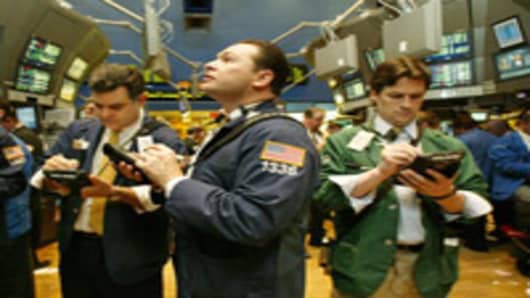"I don't see any credible scenario being a positive market-moving event," Arthur Hogan,
managing director at Jefferies, told CNBC.com. "If it's 25 basis points, we have already bought on the rumor, so will we have to sell on the news? If it's 50 basis points, there will be euphoria in the first 15 minutes, then we begin wondering if things are worse than we thought. And if the Fed leaves the rate unchanged, the market would be extremely disappointed."
"The answer may be that there is no perfect move for the Fed," adds Mike Burnick, director of research for Sovereign Society. "Even if we get a half-point cut, there may be a relief rally, but I think it will be short-lived."
What's an Investor to Do?
With that kind of scenario, what's an investor to do? Ironically, many market pros think Tuesday's widely-watched Fed meeting doesn't really matter for individual investors.
"I don't think the Fed has much of a role here and investors should not make decisions based on expectations of what the Fed is doing," Larry Edelson, senior analyst at Money and Markets, tells CNBC.com. "The markets are omnipotent and the Fed just reacts to what has already happened in the market and that's why they are always behind the curve."
"A rate cut doesn't have any actual effect on the stock market," agrees James Altucher, founder of Stockpickr.com. "Long term, there's no correlation between fed rates and stock market returns. And not only that, the banks are still nervous about lending no matter what the Fed does over the next few weeks."
Concern over the credit markets continued to plague stocks on Friday after the Bank of England had to bail out one of Britain's largest mortgage lenders.
"What is a rate cut really going to do to solve the credit crunch?" asks Burnick. "I don't think a rate cut of either a quarter- or half-point will spur a huge demand in mortgages."
Hogan says trying to make investment decisions based on what the Federal Reserve might do is a very dangerous game.
"Instead, look at Fed action as a move in the right direction in terms of fixing the economy and credit markets," he says. "Just know that the proper body is at work and on guard to make sure we have stable economic growth."
Focus on Fundamentals
Analysts say investors would be better off paying attention to fundamentals and avoiding problem areas.
Mike Malone, equity sales and trading analyst at Cowen & Company, likes the healthcare and consumer staples sectors. "I would still position myself defensively because of ongoing concerns regarding the credit markets," he said.
Art Nunes, market strategist at IMS Capital Management, is bullish on growth stocks. "We like sectors like technology and the emerging markets," he said. "These are the areas we would be investing in right now."
Nunes recommends PowerShares QQQ , which tracks the NASDAQ-100 index. "That gives you the tech play and the large-cap growth play," he said.
He also likes the iShares MSCI Emerging Markets index. "Absolutely the fastest growth on the planet is in the emerging markets," said Nunes.
Edelson with Money and Markets says overseas demand in China, India and southeast Asia is the reason he continues to recommend investments in natural resources such as oil, gold, aluminum, silver and copper. "The world has never seen this kind of demand for natural resources," he said.
Edelson suggests investors consider exchange-traded funds that track natural resources such as streetTRACKS Gold Shares . "You don't have to purchase physical gold," he said. "You can buy ETFs such as streetTRACKS Gold, which purchase the gold on your behalf."
Byron Wien, chief investment strategist for Pequot Capital Management, likes agricultural commodities. "You have wheat making a new high and I think corn has further to go," he said. "Cotton is also a very favorable place to put your money."
Energy "Place to Be"
Wien also suggests investors look at energy companies.
"Here the stocks are the place to be because they haven't reflected the higher crude price," said Wien. "Large capitalization energy stocks are selling at 10 times earnings. The stocks are way behind the commodity."
Altucher with Stockpickr.com recommends companies that are independent of a downturn in the economy, such as Universal Electronics . "Universal Electronics actually makes the patents for almost all of your remote controls," he said. So even if there's a recession, maybe more people will be watching TV at home."
He says another stock that's economy independent is American Eagle Outfitters . "The stock trades for just six and a half times cash flows," said Altucher. "Insiders are buying millions of dollars worth of stock. Teenagers are buying clothes no matter what."
Altucher also has an overseas demand play - pork. "China consumes 100 billion pounds of pork," he said. "To satisfy that growing demand, they are calling U.S.-based Smithfield Foods , which just shipped off 61 million pounds."
Altucher does not own Universal Electronics, American Eagle or Smithfield Foods.
Phyllis Burke Goffney is a news editor at CNBC.com. She can be reached at phyllis.goffney@nbcuni.com.


